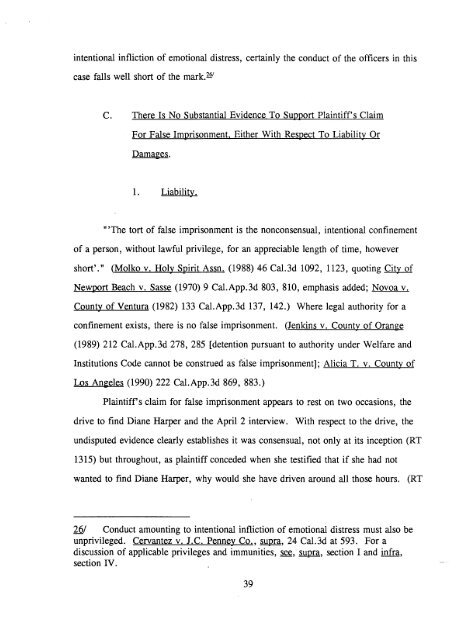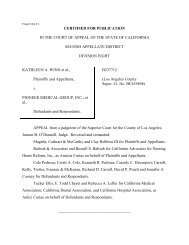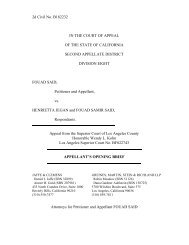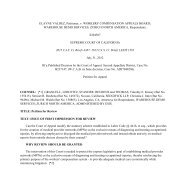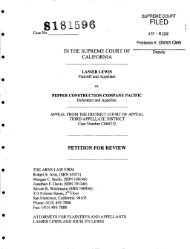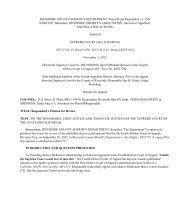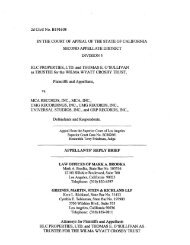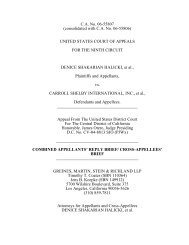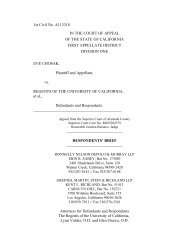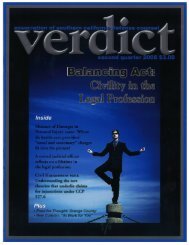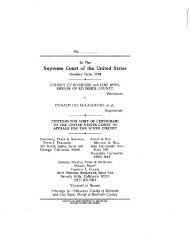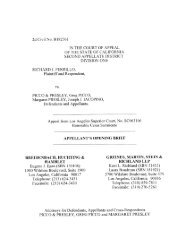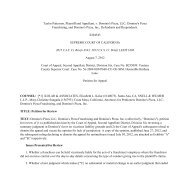Amylou R. v. County of Riverside Appellant's Opening Brief
Amylou R. v. County of Riverside Appellant's Opening Brief
Amylou R. v. County of Riverside Appellant's Opening Brief
You also want an ePaper? Increase the reach of your titles
YUMPU automatically turns print PDFs into web optimized ePapers that Google loves.
intentional infliction <strong>of</strong> emotional distress, certainly the conduct <strong>of</strong> the <strong>of</strong>ficers in this<br />
case falls well short <strong>of</strong> the mark.7:2'<br />
C. There Is No Substantial Evidence To Support Plaintiff's Claim<br />
For False Imprisonment. Either With Respect To Liability Or<br />
Damages.<br />
1. Liability.<br />
"'The tort <strong>of</strong> false imprisonment is the nonconsensual, intentional confinement<br />
<strong>of</strong> a person, without lawful privilege, for an appreciable length <strong>of</strong> time, however<br />
short'."<br />
(Molko v. Holy Spirit Assn. (1988) 46 Cal.3d 1092, 1123, quoting City <strong>of</strong><br />
Newport Beach v. Sasse (1970) 9 Cal.App.3d 803, 810, emphasis added; Novoa v.<br />
<strong>County</strong> <strong>of</strong> Ventura (1982) 133 Cal.App.3d 137, 142.) Where legal authority for a<br />
confinement exists, there is no false imprisonment.<br />
(Jenkins v. <strong>County</strong> <strong>of</strong> Orange<br />
(1989) 212 Cal.App.3d 278, 285 [detention pursuant to authority under Welfare and<br />
Institutions Code cannot be construed as false imprisonment]; Alicia T. v. <strong>County</strong> <strong>of</strong><br />
Los Angeles (1990) 222 Cal.App.3d 869, 883.)<br />
Plaintiff's claim for false imprisonment appears to rest on two occasions, the<br />
drive to find Diane Harper and the April 2 interview.<br />
With respect to the drive, the<br />
undisputed evidence clearly establishes it was consensual, not only at its inception (RT<br />
1315) but throughout, as plaintiff conceded when she testified that if she had not<br />
wanted to find Diane Harper, why would she have driven around all those hours.<br />
(RT<br />
26/ Conduct amounting to intentional infliction <strong>of</strong> emotional distress must also be<br />
unprivileged. Cervantez v. J.C. Penney Co., supra, 24 Cal.3d at 593. For a<br />
discussion <strong>of</strong> applicable privileges and immunities, see, supra, section I and infra,<br />
section IV.<br />
39


